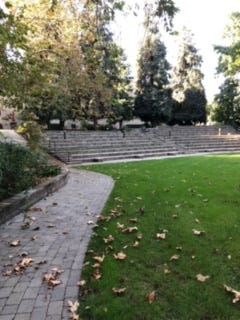All in the Journey
Reflecting on a New Year
As a graduate student, one of my favorite places, especially on the weekend, was in the stacks. I loved going among the rows and rows of academic journals that had been bound in hard cover and were in my field. I loved following up on citations and finding them and then adding them to my research. Those were heady times before the internet, before Google, those times in the stacks in the early 1990s.
One of the benefits of going among the stacks, as I saw it and still see it, was the wealth of the items I would often find along the way to my main goal. While tracking down one article, I sometimes found other articles of interest. I learned to always be open to the serendipity of finding unexpected and undeserved treasures in other journals nearby. This happened—on the way to finding stuff for my main writing project, I would find other articles.
One night when this happened, it proved to shape and change my fundamental thinking about persuasion, rhetoric, and how most people are persuaded to new ideas. I was on my way to finding an article on how probable knowledge works toward persuasion in rhetoric. Aristotle held that the best way to persuade others was through informal reasoning because for the problems that most concerned us, we could usually only have probabilities, not the certainties of first principles in logic and philosophy. He held that if we could find general agreement about a probable value, which sometimes amounted to ideas that could easily enough be countered, then we could bring others around to our main claim.
In the middle of researching probable knowledge in Aristotle, I came across an article titled “Kairos and the Rhetoric of Belief.” This was an article on pre-Aristotelian rhetoric, and it was less about logic and more about how persuasion usually comes about through timing, seasons of opportunity, and the power of language in an appropriate time. In fact, the writer saw a strong connection between this Sophistic view of persuasion and the rhetoric of conversion in the New Testament, particularly in St. Paul, who repeatedly uses the term kairos in his letters.
I was amazed. I’d struck gold. I spent the next hour reading about how kairos, or timing, could lead one to being persuaded, and even to changing ones beliefs.
This was something I discovered on the way to looking for something else, and it completely changed my way of thinking. It was my kairotic moment, and it happened in an era before Google.
I shudder occasionally when I think of how Google and Amazon have changed everything now. If there had been Google when I was a graduate student, I never would have found that article. I never would have had the opportunity for real change in my thinking. Well, maybe I would have. One never knows.
A friend of mine, a librarian and a poet, has talked about this as well. When we’re looking for a particular books or the music of one artist, we’re on a journey. Both of us prefer bookstores to Amazon. Both of us remember entering record shops where the music was playing and the album covers were out, many of them works of art, and being shown all over the store like advertisements. Moving by the racks of records, passing the jazz section, going by Motown, passing the classical section—there were always those covers that I’d read and study. Even if I wouldn’t buy the album that day, it would be in my thinking, and I might eventually.
I suspect this is something many people know that I never knew about shopping. It’s about the journey. What are we discovering along the way?
In my grief journey, I have learned more from the silence of God than the platitudes of others. I’ve long preferred not to have had to face this journey, but I also have managed to learn things along the way that were unexpected.
May this year be a positive journey for you. May you discover gems along the way, learn new things you didn’t expect. May you always be open to other articles in the stacks that you would not have found without going and looking.
Happy New Year!
For some great New Years reading, here’s a new journal that I’m proud to say I have some new poems in. I recommend the first piece of flash fiction by Adam Connors, “December 5, 1933, New York, NY,” about the holiday season deep in the depression. Both my father and uncle noted 1933 as a particularly dark year in that decade.
Read here. It’s an honor to appear alongside these artists. My first poem is a grief poem, about not seeing warning signs in a picture of our son. The second concerns the canoe trips my father would take my brother and me on when we were kids.


